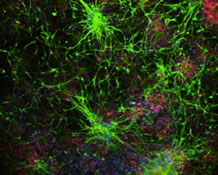Columbia University
Irving Medical Center
Neurological Institute
710 West 168th Street, 3rd floor
(212) 305-1818
Patient Care
Memory Disorder Centers
 Yaakov Stern, Ph.D.
Yaakov Stern, Ph.D.
Professor, Clinical Neuropsychology in Neurology and Psychiatry
Phone: (212) 342-1350
Fax:(212) 342-1838
Email: ys11@columbia.edu
Yaakov Stern, PhD is the Director of the Cognitive Neuroscience Division of the Sergievsky Center and the Taub Institute. His research spans several domains:
Cognitive Reserve
Dr Stern is using cognitive experimental and fMRI neuroimaging approaches to understand why some people are more susceptible to aging and disease pathology than others. He is testing the idea that individual variability can be explained by the concept of cognitive reserve. People with higher IQ's, education, occupational levels, or leisure activities have a greater cognitive reserve and can cope better with normal aging, or with the damage caused to their brains by Alzheimer's disease.
Ongoing fMRI studies are designed to explore this issue using activation paradigms that carefully control for task difficulty and evaluating differential expression of brain networks across young and old healthy individuals and patients with Alzheimer's disease. A study of sleep deprivation is another approach to understanding differential susceptibility to disruption of normal cognitive function.
Heterogeneity of Alzheimer's disease
A prospective study is designed to explore individual differences in the rate of decline and in the manifestation of cognitive, behavioral, psychiatric and neurologic features in AD patients. Ongoing clinico-pathologic studies should give insight into this heterogeneity. Parallel studies of the natural history of AD also take place in the Washington Heights community.
Dr Stern also directs the Neurophsychology and Cognition in Aging postdoctoral training program.
Selected Recent Publications:
- Stern Y, Habeck C, Moeller J, Scarmeas N, Anderson KE, Hilton HJ, Flynn J, Sackeim H, van Heertum R. Brain networks associated with cognitive reserve in healthy young and old adults. Cerebral Cortex, 2005;15:394-402.
- Holtzer R, Irizarry MC, Sanders J, Hyman BT, Wegesin DJ, Riba A, Brandt J, Albert M, Stern Y. The relation of quantitative indices of Concurrent Alpha Synuclein pathology to clinical outcome in autopsy-proven Alzheimer disease. Archives of Neurology, 2006;63:226-230.
- Stern Y, Cognitive reserve and Alzheimer disease. Alzheimer Dis Assoc Disord. 2006;20(3 Suppl 2):S69-74.
- Zhu CW, Scarmeas N, Torgan R, Albert M, Brandt J, Blacker D, Sano M, Stern Y. Clinical characteristics and longitudinal changes of informal cost of Alzheimer's disease in the community. J Am Geriatr Soc. 2006;54(10):1596-602.
- Stern Y. What is cognitive reserve? Theory and research application of the reserve concept. JINS 2002;8:448-460.

